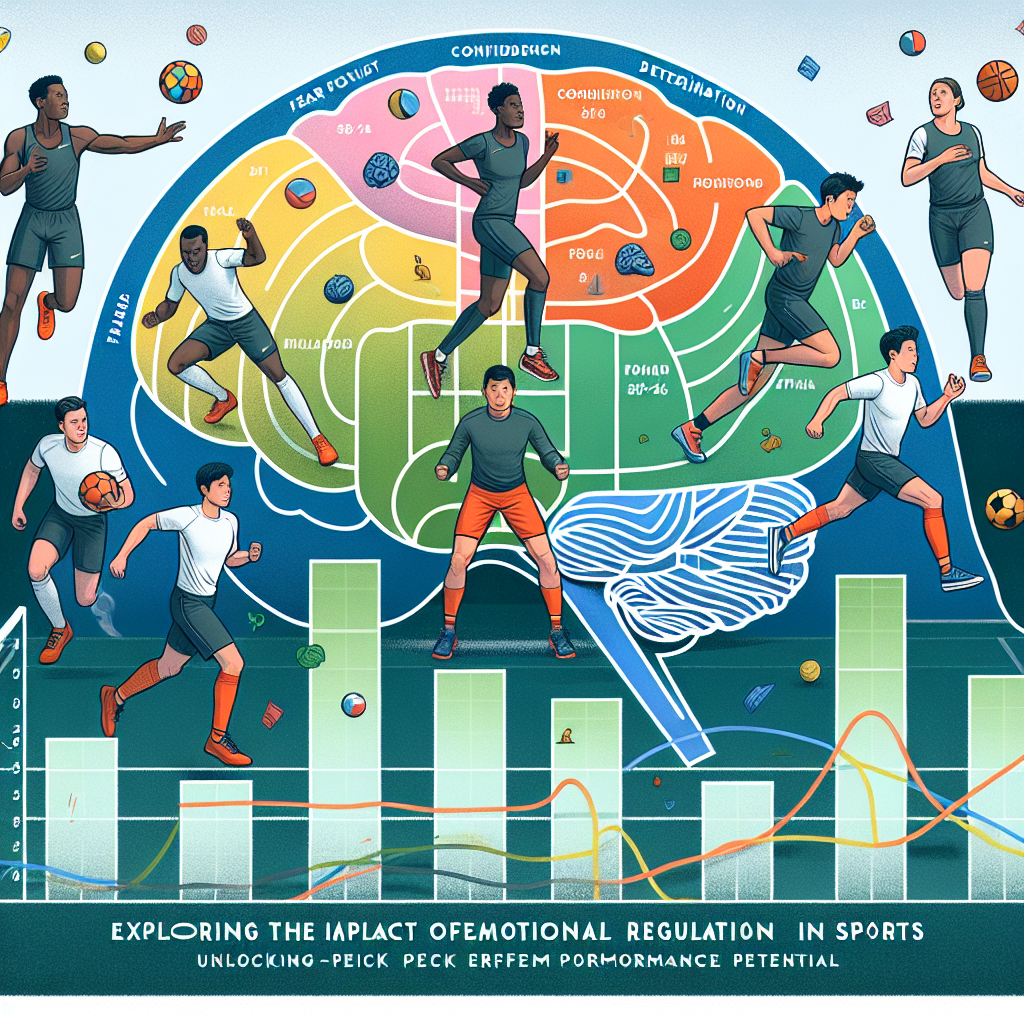Emotional regulation in sports is a critical aspect of athletes’ performance and overall well-being on the field. It involves the ability to harness and control one’s emotions in high-pressure situations, leading to increased focus, resilience, and ultimately peak performance. By mastering the art of emotional regulation, athletes can unlock their full potential and achieve greater success in their respective sports. This concept goes beyond just physical skills – it delves into the mental and emotional fortitude needed to conquer challenges and push boundaries. Join us on a journey to explore the impact of emotional regulation in sports and discover the key to reaching new heights in athletic achievement.
Understanding Emotional Regulation in Sports

Emotional regulation in sports refers to the ability of athletes to manage and control their emotions effectively in order to optimize their performance. This skill involves being aware of one’s emotions, understanding how they can impact performance, and implementing strategies to regulate them. In the high-pressure environment of sports, emotional regulation plays a crucial role in determining an athlete’s success or failure.
Definition of emotional regulation in the context of sports
Emotional regulation in sports encompasses techniques and practices that help athletes maintain a balanced emotional state during training and competition. It involves the ability to recognize and manage emotions such as anxiety, frustration, excitement, and disappointment in a way that does not interfere with performance. Athletes who excel in emotional regulation can stay focused, composed, and in control even in challenging situations.
Importance of emotional regulation for athletes’ performance
Emotional regulation is essential for athletes to perform at their best consistently. When athletes are unable to regulate their emotions, it can lead to decreased focus, heightened stress levels, and impaired decision-making abilities. On the other hand, athletes who effectively manage their emotions can stay calm under pressure, adapt to changing circumstances, and maintain a positive mindset throughout the competition. This not only enhances their performance but also contributes to their overall well-being and mental resilience.
How emotions can affect athletic performance
Emotions have a direct impact on athletic performance, influencing various cognitive and physiological processes. For example, feelings of anxiety can disrupt concentration and coordination, leading to errors and subpar performance. Conversely, a sense of confidence and determination can boost motivation and energy levels, resulting in enhanced performance outcomes. By understanding how different emotions can affect their performance, athletes can develop strategies to regulate their emotions and optimize their overall athletic experience.
The Role of Emotional Intelligence in Sports
Emotional intelligence plays a crucial role in the world of sports, influencing athletes’ ability to manage their emotions effectively, make sound decisions under pressure, and maintain focus during competition. Understanding and harnessing emotional intelligence can significantly impact an athlete’s performance and overall success in their chosen sport.
- Exploring the concept of emotional intelligence in athletes
Emotional intelligence in athletes refers to their ability to recognize, understand, and manage their own emotions, as well as the emotions of others. It involves being aware of how emotions can impact performance, relationships with teammates and coaches, and overall well-being in the sporting environment. Athletes with high emotional intelligence are better equipped to navigate the challenges and stresses that come with competitive sports.
- How emotional intelligence contributes to better emotional regulation
Athletes with high emotional intelligence can regulate their emotions more effectively, preventing feelings of anger, frustration, or anxiety from negatively affecting their performance. By developing skills such as self-awareness, self-regulation, empathy, and social skills, athletes can maintain composure in high-pressure situations, bounce back from setbacks, and stay focused on their goals.
-
Strategies to enhance emotional intelligence for improved sports performance
-
Self-reflection: Encouraging athletes to reflect on their emotions, reactions, and behaviors can help them gain insights into their emotional patterns and triggers.
-
Mindfulness practices: Teaching athletes mindfulness techniques can enhance their ability to stay present, manage stress, and improve their emotional regulation skills.
-
Emotional regulation training: Providing athletes with tools and strategies to regulate their emotions, such as deep breathing exercises, visualization techniques, or positive self-talk, can help them stay calm and composed during competition.
-
Seeking professional support: Working with sports psychologists or mental performance coaches can offer athletes personalized guidance and support in developing their emotional intelligence skills, ultimately leading to improved sports performance and overall well-being.
Common Emotional Challenges in Sports
In the realm of sports, athletes often encounter a myriad of emotional challenges that can significantly impact their performance on the field or court. These challenges can range from pre-competition nerves to the pressure of high-stakes games, all of which can influence an athlete’s mental state and, consequently, their physical capabilities.
Identifying Common Emotional Challenges Faced by Athletes
1. Pre-Competition Anxiety:
Athletes frequently experience heightened levels of anxiety and nervousness before a competition. This pre-game jitters can stem from the fear of failure, the pressure to perform well, or the anticipation of facing tough opponents.
2. Fear of Failure:
The fear of not meeting personal or external expectations can weigh heavily on an athlete’s mind. This fear can manifest as self-doubt, negatively impacting their confidence and overall performance.
3. Dealing with Criticism:
Athletes often face criticism from coaches, teammates, fans, and the media. Learning how to manage and respond to criticism constructively is crucial for maintaining emotional stability and focus.
Impact of Stress, Anxiety, and Pressure on Athletic Performance
1. Performance Decline:
High levels of stress, anxiety, and pressure can lead to a decline in an athlete’s performance. Overthinking, muscle tension, and reduced focus are common manifestations of these emotional challenges.
2. Impaired Decision-Making:
Emotional turmoil can cloud an athlete’s judgment and decision-making abilities during crucial moments in a game. This can result in poor choices, missed opportunities, and ultimately, subpar performance.
3. Physical Manifestations:
Stress and anxiety can also manifest physically, leading to symptoms such as rapid heartbeat, sweating, and shallow breathing. These physical manifestations can further impede an athlete’s performance on the field.
The Relationship Between Emotions and Physical Performance in Sports
1. Mind-Body Connection:
Emotions have a direct impact on an athlete’s physical performance. Positive emotions like confidence and determination can enhance physical capabilities, while negative emotions can hinder performance.
2. Energy Management:
Emotional regulation plays a crucial role in managing an athlete’s energy levels during competition. Balancing emotions helps in conserving energy for optimal physical output when it matters most.
3. Mental Toughness:
Athletes who excel in emotional regulation often exhibit higher levels of mental toughness. This resilience allows them to overcome setbacks, handle pressure effectively, and maintain peak performance levels consistently.
Strategies for Effective Emotional Regulation
Emotional regulation is a critical aspect of sports performance, influencing an athlete’s ability to stay focused, motivated, and resilient in the face of challenges. Implementing effective strategies for managing emotions can significantly impact an athlete’s overall performance and potential for success. The following techniques are essential for athletes looking to enhance their emotional regulation skills:
- Techniques for managing stress and anxiety during competitions
- Utilizing deep breathing exercises to calm nerves and refocus attention during high-pressure situations.
- Engaging in visualization techniques to mentally rehearse success and reduce performance anxiety.
-
Establishing pre-competition routines to create a sense of familiarity and control over the competitive environment.
-
Importance of mindfulness and self-awareness in emotional regulation
- Practicing mindfulness meditation to enhance present-moment awareness and emotional control.
- Developing self-awareness through reflective practices such as journaling or seeking feedback from coaches and teammates.
-
Recognizing and acknowledging emotions without judgment to effectively manage them in a constructive manner.
-
Building resilience and coping mechanisms for handling emotional challenges in sports
- Embracing setbacks and failures as opportunities for growth and learning rather than sources of frustration.
- Cultivating a positive and resilient mindset through affirmations, goal-setting, and positive self-talk.
- Seeking support from sports psychologists or mental performance coaches to develop personalized coping strategies for navigating emotional challenges in sports.
Implementing Emotional Regulation Techniques in Training
Emotional regulation techniques play a crucial role in enhancing athletes’ performance by helping them manage stress, anxiety, and other emotional challenges effectively. Integrating these techniques into sports training programs can significantly impact athletes’ ability to perform at their peak. Here are key strategies for implementing emotional regulation techniques in training:
-
Incorporating Mindfulness Practices: Training sessions can include mindfulness exercises such as deep breathing, body scans, and visualization to help athletes stay present and focused during practice and competition.
-
Utilizing Cognitive Behavioral Therapy (CBT): Teaching athletes cognitive restructuring techniques can help them challenge and reframe negative thoughts and emotions that may hinder their performance.
-
Encouraging Emotional Awareness: Coaches can create a supportive environment where athletes are encouraged to recognize and express their emotions openly. This can help athletes develop a better understanding of their emotional responses and learn how to regulate them effectively.
-
Providing Individualized Support: Tailoring emotional regulation training to meet the specific needs of each athlete can enhance its effectiveness. Coaches and sports psychologists can work closely with athletes to identify their emotional triggers and develop personalized strategies for managing them.
-
Integrating Relaxation Techniques: Teaching athletes relaxation techniques such as progressive muscle relaxation, guided imagery, and meditation can help them reduce stress and anxiety levels, leading to improved performance on the field or court.

The Psychological Benefits of Emotional Regulation in Sports
Emotional regulation plays a crucial role in determining an athlete’s performance on the field. By effectively managing their emotions, athletes can unlock their peak performance potential and achieve success in their respective sports. Let’s delve into the specific psychological benefits of emotional regulation in sports:
- Improved Focus and Concentration:
- Athletes who practice emotional regulation techniques exhibit higher levels of focus and concentration during training sessions and competitions.
- By controlling their emotional responses to various stimuli, athletes can avoid distractions and maintain their attention on the task at hand.
-
This heightened focus enables athletes to execute their skills with precision and make split-second decisions more effectively.
-
Enhancing Decision-making Skills:
- Emotional regulation empowers athletes to make better decisions under pressure.
- By keeping emotions in check, athletes can think more clearly and rationally when faced with challenging situations during a game.
-
This ability to regulate emotions allows athletes to assess risks, weigh options, and choose the most appropriate course of action, leading to improved performance outcomes.
-
Impact of Positive Emotions:
- Cultivating positive emotions through emotional regulation can significantly enhance an athlete’s overall performance.
- Positive emotions, such as joy, confidence, and enthusiasm, have been linked to increased motivation, resilience, and creativity in sports.

- Athletes who harness positive emotions through effective regulation strategies are more likely to experience flow states, where they perform at their best with effortless concentration and enjoyment.
Future Trends in Emotional Regulation Research in Sports
Emerging technologies and tools for monitoring and enhancing emotional regulation in athletes
In the realm of emotional regulation research in sports, there is a growing emphasis on leveraging emerging technologies and tools to monitor and enhance athletes’ emotional states. Wearable devices equipped with biosensors are being developed to track physiological markers such as heart rate variability, skin conductance, and cortisol levels, providing real-time data on athletes’ emotional responses during training and competition. These innovative tools offer valuable insights into how emotions impact performance, allowing for tailored interventions and strategies to optimize emotional regulation for peak athletic achievement.
Collaborative efforts between sports psychologists and coaches for optimizing emotional regulation strategies
Another trend in emotional regulation research in sports is the increasing collaboration between sports psychologists and coaches to optimize strategies for managing emotions effectively. By bridging the gap between mental health professionals and sports practitioners, athletes can benefit from comprehensive support systems that address both the psychological and performance aspects of emotional regulation. This interdisciplinary approach not only enhances athletes’ self-awareness and emotional intelligence but also equips them with practical tools to navigate stress, pressure, and setbacks in their sporting endeavors.
The potential impact of emotional regulation advancements on the future of sports performance
Looking ahead, emotional regulation advancements have the potential to revolutionize the landscape of sports performance by unlocking athletes’ peak potential. By honing their ability to regulate emotions such as anxiety, anger, and self-doubt, athletes can cultivate mental resilience, focus, and motivation essential for achieving optimal performance outcomes. As emotional regulation strategies become more personalized and evidence-based, athletes are poised to experience heightened psychological well-being, enhanced decision-making skills, and increased consistency in their competitive performances. Ultimately, the future of sports performance may be defined by athletes who not only excel physically but also demonstrate mastery over their emotions to achieve unparalleled success on and off the field.
FAQs
What is emotional regulation in sports?
Emotional regulation in sports refers to the ability of athletes to effectively manage and control their emotions in order to enhance their performance. It involves recognizing and acknowledging emotions such as anxiety, frustration, or excitement, and implementing strategies to handle them in a constructive manner. By regulating their emotions, athletes can maintain focus, make better decisions, and ultimately optimize their performance on the field or court.
How does emotional regulation impact athletic performance?
The impact of emotional regulation on athletic performance is significant. When athletes can manage their emotions and remain calm under pressure, they are better able to concentrate, problem-solve, and execute their skills with precision and efficiency. By controlling negative emotions such as anger or fear, athletes can also avoid distractions and maintain a positive mindset, which can ultimately lead to improved athletic outcomes and overall success.
What are some strategies for improving emotional regulation in sports?
There are several effective strategies that athletes can utilize to improve their emotional regulation skills. These may include deep breathing exercises, visualization techniques, mindfulness practices, and cognitive reframing. Seeking support from a sports psychologist or mental skills coach can also be beneficial in developing emotional regulation skills. Additionally, creating a pre-game routine that includes relaxation techniques and positive affirmations can help athletes prepare mentally and emotionally for competition.
Can emotional regulation in sports help prevent burnout and injuries?
Yes, emotional regulation in sports can play a crucial role in preventing burnout and injuries among athletes. By effectively managing stress, anxiety, and other negative emotions, athletes can reduce the risk of mental and physical exhaustion that can lead to burnout. Additionally, by maintaining emotional control and focus, athletes are less likely to engage in risky behavior or make poor decisions that could result in injuries. Implementing emotional regulation techniques can therefore contribute to the overall well-being and longevity of athletes in their respective sports.

